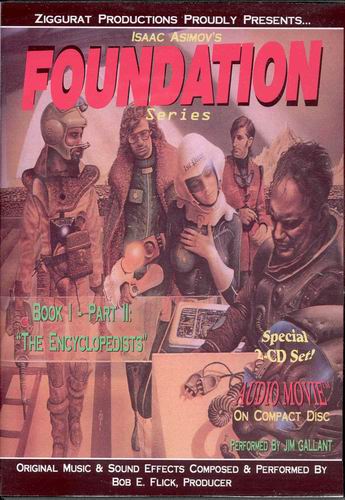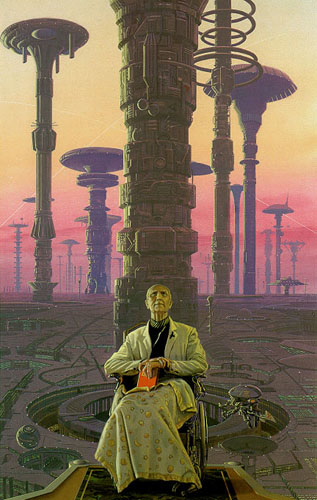“Violence is the last refuge of the incompetent.”
– Isaac Asimov, Salvor Hardin in “Foundation”
 Isaac Asimov’s Foundation |
A scientist, Hari Seldon, is on trial for treason. His crime: Mathematically proving the Empire will collapse within five centuries. Nothing can avert this disaster, but the Seldon warns there can be either 30,000 years of anarchy and suffering across the galaxy, or the disaster can be limited to one millenia.
Thus opens Isaac Asimov’s epic Foundation series, a collection of novels that took him 49 years to write and eventually drew all of his science ficiton works into this single universe. The Empire at the book’s beginnning spans the entire galaxy. When it collapses, the millions of habitable worlds within its domain will become isolated as trade routes close. As the markets collapse and people become completely preoccupied with mere survival, technologies and other advances will fall to the wayside and be forgotten. Hari Seldon, using a mathematical science that only exists in fiction called psychohistory, has predicted the innevitability of this decline, similar to our fall of the Roman Empire.
To reduce the period of barbarism from 30,000 years to 1,000, Hari Seldon has the Emperor establish two Foundations at opposite ends of the galaxy, where a community of scientists will preserve all of the human race’s knowledge about the physical world.
First let me address what’s wrong with these novels:
The books are flawed for being patriarchal, and I concur that, as someone who grew up with heros like Sigorny Weaver in Aliens and strong female roles in Star Trek (Science Fiction has always been so progressive), my enjoyment of the book suffers from these antiquated gender roles. There are two means of understanding why this mistake occurred. Firstly, the book was written in the 1950s, so of course it would carry the cultural morass of its society. Asimov was only human afterall, and we should forgive his lack of vision concerning differences between the sexes. He did consider himself a feminist long before the term was coined, and attributes his lack of strong female characters to inexperience.
The second explanation raises further problems, the societies in the trilogy are medeval in nature, monarchies with Kings, Queens, Barons, and other social parasites. This also hurts the believablity of Asimov’s universe. Just as many Astroanthropologists wonder, “Why would aliens travel X-Billion light years to probe our anuses?” readers may wonder how a species so flawed, ignorant, and self-destructive as those in Foundation’s universe could manage to populate the entire galaxy?
But the story is a fable. Space Opera, not Hard SF, and must be read as a fairy tale, where the fantasy serves as the vehicle for conveying the timelessness of the message.
 Isaac Asimov’s Foundation |
So now let me tell you what’s so right with these books to make them qualify as science literature:
Asivov predicts a future where psychology is a concrete mathematical science. We see this fiction becoming reality in our own lifetimes withe the emergence of Evolutionary Psychology and Neuroscience. The story’s timeline jumps in leaps and bounds. A few decades here, a century there, and although the story focuses more on individuals as it progresses, the focus is primarily on ideas
The heroes of the book are scientists… or more accurately, science is the book’s primary hero. The scientists start out as insulated from the rest of the world as they tended to be in our modern world for decades, only when circumstances force them to interact with the rest of the galaxy is the power of science illustrated. The scientists roaming the galaxy are like wizards or magicians, their technology a form of magic. They become legendary, and a mythos spreads concerning them wherever they make contact.
The book’s other hero is Capitalism, as the scientists lack the military strength of their barbarian neighbors, they must find nonviolent means of dominating them and restoring order to the galaxy. Just as America much more effectively uses its economic strength to persuade the world than its military, so do the scientists use market forces to influence and fend off the barbaric civilizations.
Nonviolence is a pervading theme throughout the books. The heros never resort to violence as a means because, as the character Salvor Hardin notes, it “is the last refuge of the incompetent.” Instead, the characters must use technology and persuation to overcome their obstacles.
Asimov has constructed a universe where the ultimate hero is the “roving mind,” and its lessons apply to our everyday lives.
 Isaac Asimov’s Foundation |